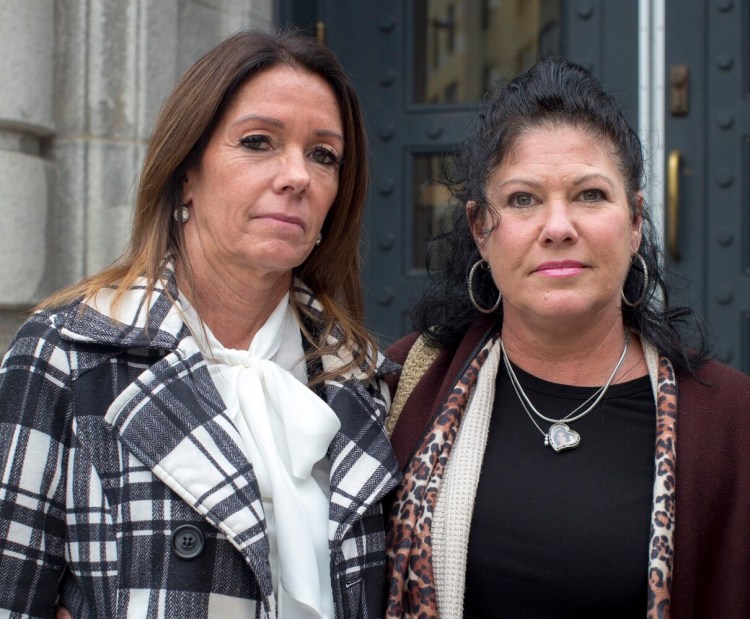Nearly seven years after a Biddeford landlord shot and killed two teenagers in his apartment building, a federal judge will decide whether the city bears any legal responsibility for their deaths.

Biddeford landlord James Pak made death threats before he killed Derrick Thompson and Alivia Welch in 2012, a 911 call transcript shows.
James Pak, now 81, is serving a life sentence for the December 2012 murders of Derrick Thompson, 19, and his girlfriend, Alivia Welch, 18. Pak also shot Thompson’s mother, Susan Stevens, but she survived the attack.
Court documents show Thompson called police that day to report that Pak had threatened them, but the officers never asked Pak if he had a gun and left when they decided the dispute was a civil matter. Within minutes, Pak entered the apartment with a gun and shot the three tenants.
Stevens and Jocelyne Welch, Alivia Welch’s mother, later filed separate wrongful death lawsuits in U.S. District Court in Portland. Their two cases merged last year. The defendants are the city of Biddeford and its police department, police Chief Roger Beaupre and the two individual officers who responded that day.
The lawsuits allege 21 claims – including intentional infliction of emotional distress, deprivation of constitutional rights, civil conspiracy and due process violations – and seek unspecified damages.
The city’s attorneys filed a motion for summary judgment earlier this summer, asking the court to find in their favor and dismiss the case. District Judge Jon Levy heard oral arguments on that motion Wednesday afternoon.
“This is, of course, one of the more tragic cases I have encountered,” Levy said at the end of the hearing. “The legal issues you have presented are also complex, so I’m going to take my time.”
The city’s motion argues that the two mothers have not met their legal burden to hold Biddeford officials and police officers responsible for their children’s deaths. It recounted conversations between the police on scene and the people at the Sokokis Road building. At one point, an officer asked Thompson if he felt threatened, and Thompson said, “Not really.” The officers decided they did not have grounds to arrest Pak for criminal threatening or any other charge, and the motion argued that they acted within their discretion.

James Pak, seen in court in 2016, is now serving life in prison for murdering two teenagers and shooting a woman who was his tenant in 2012. Whitney Hayward/Staff Photographer
“These cases, which are all born out of tragedies and which cause one to question whether something could have been done to change the course of events, make clear that the state of the law is not to hold police officers liable for the heinous actions of third parties on a failure to protect theory unless the officer did something to cause or exacerbate the danger to the victim,” the motion states.
Levy said the police officer’s interactions with Pak could be interpreted in different ways, and he asked whether he should find that the officer’s actions influenced the tragedy that followed.
“Because it has to be more, your honor, than mere conjecture,” said attorney Douglas Louison, who represents the city defendants.
But Stevens and Welch argue in their response that the officers should be held accountable for failing to arrest or detain Pak. Their attorneys said Pak told one officer that he had nothing to lose, that he would be in the newspaper and that it would be “a bloody mess.” They also said the officer cut off Thompson before he could elaborate during their conversation about feeling threatened and disputed whether he asked the other two tenants the same question.
“Within four minutes of Officer (Edward) Dexter clearing the scene, two residents were dead and one had been seriously injured,” the motion states. “As argued above, his failure to act was a direct cause of the harm to plaintiffs.”
Attorney Kristine Hanly represents Susan Stevens, whose last name was previously Johnson. Attorney Sarah Churchill represents Jocelyne Welch. Both lawyers participated in the arguments Wednesday.
Levy asked about the officers’ decision not to make an arrest and about the argument that the city defendants are immune to the claims against them.
Hanly said the officers failed to warn the tenants about threats Pak made in conversation with the officers, which might have helped them protect themselves.
“The officers were faced with specific threats of harm against specific people,” Hanly said.
Churchill emphasized the mere minutes that passed between the police officer’s departure and the shootings.
“The short nature of that timespan, I think, is an extremely powerful fact in this case,” Churchill said.
The judge does not have a timetable to make his decision. If he denies the city’s motion entirely or in part, any claims that remain will continue toward a civil trial.
“I miss my son, Derrick, every day,” Stevens said in a written statement provided by her lawyer. “No result in a lawsuit will bring him back, but I hope the Judge allows the case to move forward so we can hold the defendants accountable for their actions.”
After the hearing, the two women talked quietly with their attorneys and family members who had attended. Welch, who wore her daughter’s picture in a small heart-shaped frame on a necklace, wiped her eyes with a tissue. Stevens left in her pickup truck, with the teenagers’ names printed on the back window in memorial.
Correction: This story was updated at 11:23 a.m. on October 21, 2019 to correct the name of the street where the murders of Derrick Thompson and Alivia Welch took place.
Comments are not available on this story.
Send questions/comments to the editors.



